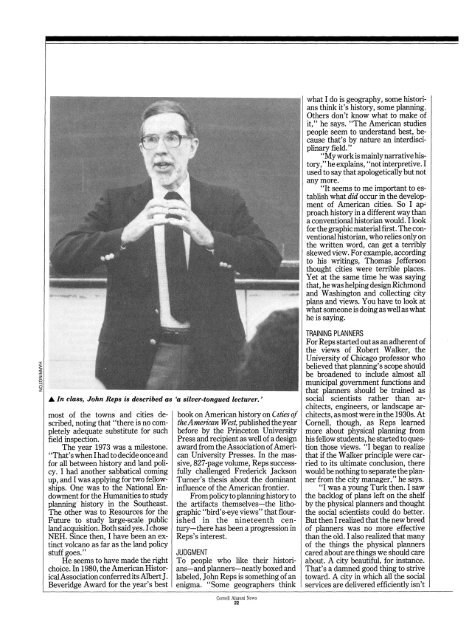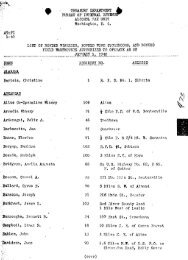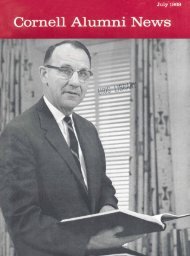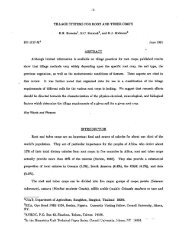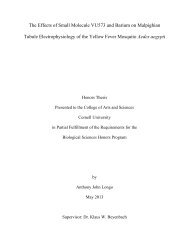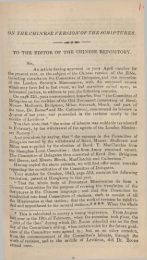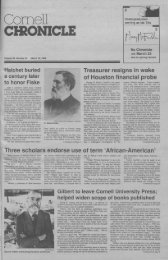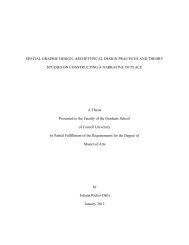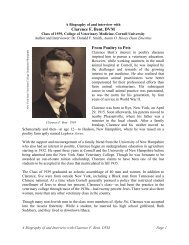City Views - eCommons@Cornell - Cornell University
City Views - eCommons@Cornell - Cornell University
City Views - eCommons@Cornell - Cornell University
You also want an ePaper? Increase the reach of your titles
YUMPU automatically turns print PDFs into web optimized ePapers that Google loves.
what I do is geography, some historians<br />
think it's history, some planning.<br />
Others don't know what to make of<br />
it," he says. "The American studies<br />
people seem to understand best, because<br />
that's by nature an interdisciplinary<br />
field."<br />
' 'My work is mainly narrative history,<br />
'' he explains,' 'not interpretive. I<br />
used to say that apologetically but not<br />
any more.<br />
"It seems to me important to establish<br />
what did occur in the development<br />
of American cities. So I approach<br />
history in a different way than<br />
a conventional historian would. I look<br />
for the graphic material first. The conventional<br />
historian, who relies only on<br />
the written word, can get a terribly<br />
skewed view. For example, according<br />
to his writings, Thomas Jefferson<br />
thought cities were terrible places.<br />
Yet at the same time he was saying<br />
that, he was helping design Richmond<br />
and Washington and collecting city<br />
plans and views. You have to look at<br />
what someone is doing as well as what<br />
he is saying.<br />
TRAINING PLANNERS<br />
For Reps started out as an adherent of<br />
the views of Robert Walker, the<br />
<strong>University</strong> of Chicago professor who<br />
believed that planning's scope should<br />
be broadened to include almost all<br />
municipal government functions and<br />
that planners should be trained as<br />
c/αss, John Reps is described as 'a silver-tongued lecturer.' social scientists rather than architects,<br />
engineers, or landscape architects,<br />
as most were in the 1930s. At<br />
most of the towns and cities described,<br />
noting that' 'there is no com-<br />
the American West, published the year <strong>Cornell</strong>, though, as Reps learned<br />
book on American history on Cities of<br />
pletely adequate substitute for such before by the Princeton <strong>University</strong> more about physical planning from<br />
field inspection.<br />
Press and recipient as well of a design his fellow students, he started to question<br />
those views. "I began to realize<br />
The year 1973 was a milestone. award from the Association of American<br />
<strong>University</strong> Presses. In the mas-<br />
that if the Walker principle were car-<br />
* That's when I had to decide once and<br />
for all between history and land policy.<br />
I had another sabbatical coming fully challenged Frederick Jackson would be nothing to separate the plansive,<br />
827-page volume, Reps successried<br />
to its ultimate conclusion, there<br />
up, and I was applying for two fellowships.<br />
One was to the National En-<br />
influence of the American frontier.<br />
"I was a young Turk then. I saw<br />
Turner's thesis about the dominant ner from the city manager," he says.<br />
dowment for the Humanities to study From policy to planning history to the backlog of plans left on the shelf<br />
planning history in the Southeast. the artifacts themselves—the lithographic<br />
"bird's-eye views" that flour-<br />
the social scientists could do better.<br />
by the physical planners and thought<br />
The other was to Resources for the<br />
Future to study large-scale public ished in the nineteenth century—there<br />
has been a progression in of planners was no more effective<br />
But then I realized that the new breed<br />
land acquisition. Both said yes. I chose<br />
NEH. Since then, I have been an extinct<br />
volcano as far as the land policy<br />
of the things the physical planners<br />
Reps's interest.<br />
than the old. I also realized that many<br />
stuff goes."<br />
JUDGMENT<br />
cared about are things we should care<br />
He seems to have made the right To people who like their historians—and<br />
planners—neatly boxed and That's a damned good thing to strive<br />
about. A city beautiful, for instance.<br />
choice. In 1980, the American Historical<br />
Association conferred its Albert J. labeled, John Reps is something of an toward. A city in which all the social<br />
Beveridge Award for the year's best enigma. "Some geographers think services are delivered efficiently isn't<br />
<strong>Cornell</strong> Alumni News<br />
22


